
17th Lab-on-a-Chip and Microfluidics World Congress 2024
Abe Lee Biographical Sketch
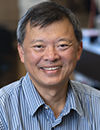
Abraham Lee, Chancellor’s Professor, Biomedical Engineering & Director, Center for Advanced Design & Manufacturing of Integrated Microfluidics, University of California-Irvine
Abraham (Abe) P. Lee is Chancellor’s Professor of Biomedical Engineering (BME) and MAE at the University of California, Irvine (UCI). He served as department chair for BME from 2010-2019. He is currently Director of the NSF I/UCRC “Center for Advanced Design & Manufacturing of Integrated Microfluidics” (CADMIM). Dr. Lee served as Editor-in-Chief for the Lab on a Chip journal from 2017-2020. Prior to UCI, he was Senior Technology Advisor at National Cancer Institute (NCI), Program Manager in the Microsystems Technology Office at DARPA (1999-2001), and a group leader with Lawrence Livermore National Lab (LLNL). Dr. Lee’s current research focuses on integrated microfluidic systems for precision medicine including liquid biopsy, microphysiological systems, cell engineering, and immunotherapy. His research has contributed to the founding of several start-up companies. He is inventor of over 60 issued US patents and is author of over 130 journals articles. Professor Lee was awarded the 2009 Pioneers of Miniaturization Prize and is fellow of the National Academy of Inventors (NAI), the American Institute of Medical and Biological Engineering (AIMBE), the Royal Society of Chemistry (RSC), the American Society of Mechanical Engineering (ASME), the International Academy of Medical and Biological Engineering, and the Biomedical Engineering Society (BMES).
Adam Abate Biographical Sketch
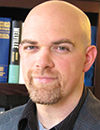
Adam Abate, Professor of Bioengineering and Therapeutic Sciences, University of California-San Francisco
Dr. Adam Abate is a physicist who brings a unique research program to UCSF. His research employs microfluidics for high-throughput biological applications. He has developed microfluidic methods to create emulsions that consist of droplets of very precise and consistent sizes and to manipulate the processing and contents of individual droplets in different ways. The droplets are used to create micro-compartments, which can be loaded with single cells and other active materials, such as drugs, nutrients, and assay reagents. By chaining together different microdevice components, the droplets can be used as tiny "test tubes" for performing chemical and biological reactions. This allows multiple, independent reactions to take place at the rate of thousands per second, while using minuscule amounts of total reagent. Adam is using this approach for directed evolution, genetic sequencing, and cell sorting.
Bryce Hiller Biographical Sketch

Bryce Hiller, Digital Education Coordinator, ASIGA
Bryce Hiller has a Bachelor’s Degree in Information Sciences and Marketing from Indiana-Wesleyan University He has extensive experience in dental 3D printing and received his lab experience in his family lab, where he was instrumental in transitioning the lab from analog technology to digital. As he has expanded his 3D printing acumen into multiple industries, Bryce’s goal is to foster innovation and empower professionals in the additive manufacturing space with various CAD/CAM and digital manufacturing technologies.
Christoph Zellweger Biographical Sketch
Christoph Zellweger, Area Sales Manager, IMT Precision on Glass
Christoph Zellweger joined IMT in 2019 as an Area Sales Manager. He has a degree in Physics and a PhD from the Swiss Federal Institute of Technology and has over 20 years of experience in Photonics, Glass Processing and Microlithography.
Claudia Gärtner Biographical Sketch

Claudia Gärtner, CEO, microfluidic ChipShop GmbH
Dr. Claudia Gärtner studied chemistry and biology and has earned her diploma and PhD in chemistry at the University of Düsseldorf in 1996. Between 1996 and 1999, she worked as an assistant to the Director at the Institute for Microtechnology in Mainz (IMM), where she coordinated large scale international projects (e.g. TMR-project MICROSYNC, LSF-project). In 1999 she was appointed Director of the Application Centre for Microtechnology in Jena, a daughter institution of the Fraunhofer Institute for Applied Optics and Precision Engineering. In 2002 she founded MFCS together with Dr. Holger Becker. Since April 2006 she is CEO of microfluidic ChipShop. She has been coordinator of numerous R&D projects on national and international level, including the FP 7 IP Multisense Chip. In 2017 she was decorated with the 3rd prize as Women Innovator competition by the European Commission. She is in the board of trustees of the German Museum in Munich and the advisory board of the Trade Fair in Erfurt, Thuringia, Germany. Lab-on-a-Chip system as bleed-to-read-systems including their manufacturing and commercialization are in her focus.
David Weitz Biographical Sketch
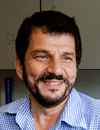
David Weitz, Mallinckrodt Professor of Physics and Applied Physics, Director of the Materials Research Science and Engineering Center, Harvard University
Professor David Weitz received his PhD from Harvard. He worked at Exxon Research and Engineering as a research physicist for nearly 18 years, and then became a Professor of Physics at the University of Pennsylvania. He moved to Harvard at the end of the last century, and is currently Professor of Physics and Applied Physics. He is also the director of Harvard's Materials Research Science and Engineering Center. Several start-up companies have come from his lab to exploit some of the technological applications of his work.
Professor Weitz is Mallinckrodt Professor of Physics and Applied Physics, Director of the Materials Research Science and Engineering Center, Co-Director of the BASF Advanced Research Initiative, Associate Faculty Member, Wyss Institute for Biologically Inspired Engineering and Member, Kavli Institute for Bionano Science & Technology.
Dino Di Carlo Biographical Sketch
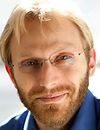
Dino Di Carlo, Armond and Elena Hairapetian Chair in Engineering and Medicine, Professor and Chair of Bioengineering, University of California-Los Angeles
Dino Di Carlo received his B.S. in Bioengineering from the University of California, Berkeley in 2002 and received a Ph.D. in Bioengineering from the University of California, Berkeley and San Francisco in 2006. From 2006-2008 he conducted postdoctoral studies in the Center for Engineering in Medicine at Harvard Medical School. He has been on the faculty in the Department of Bioengineering at UCLA since 2008 and now as Professor of Bioengineering and Mechanical Engineering serves as the Chair of the Department and as the director of the Cancer Nanotechnology Program in the Jonsson Comprehensive Cancer Center. His research pioneered the use of inertial fluid dynamic effects for the control, separation, and analysis of cells in microfluidic devices. His recent work extends into numerous other fields of biomedicine and biotechnology including directed evolution, cell analysis for rapid diagnostics, new amplified molecular assays, next generation biomaterials, and phenotypic drug screening. He has also been a leader in technology entrepreneurship: He co-founded and currently serves on the board of directors of five companies that are commercializing UCLA intellectual property developed in his lab (CytoVale, Vortex Biosciences, Tempo Therapeutics, Forcyte Biotechnologies and Ferrologix). Among other honors he received the Presidential Early Career Award for Scientists and Engineers (PECASE) and was elected a Fellow of the American Institute for Medical and Biological Engineering in 2016, was elected a Fellow of the Royal Society of Chemistry (FRSC) in 2014, was awarded the National Science Foundation (NSF) Faculty Early Career Development award and the U.S. Office of Naval Research (ONR) Young Investigator Award, the Packard Fellowship and Defense Advanced Research Projects Agency (DARPA) Young Faculty Award, and received the National Institutes of Health (NIH) Director’s New Innovator Award and Coulter Translational Research Award.
Eric Diebold Biographical Sketch

Eric Diebold, WW Vice President, Research and Development, BD Biosciences
Eric Diebold is the Worldwide Vice President of Research and Development for BD Biosciences, where he leads all aspects of product and technology development for the Biosciences business unit within Becton Dickinson and Co., one of the world’s largest medical technology companies. Eric has been with BD Biosciences for the past 7 years, where he has served in roles of increasing responsibility within the R&D function. Prior to BD, Eric was the CEO and Founder of Omega Biosystems Incorporated, which was acquired by BD in 2017. Eric received his BS in Electrical Engineering and Physics from Duke University, and his PhD in Applied Physics from Harvard University. He lives in Menlo Park, CA with his wife and three sons.
Gregory Nordin Biographical Sketch
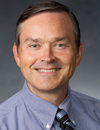
Gregory Nordin, Professor, Brigham Young University
Professor Greg Nordin joined the faculty of the Electrical & Computer Engineering Department at Brigham Young University in 2005. From 1992 to 2005 he was at The University of Alabama in Huntsville (UAH) where he was the founding director of the university's Nano and Micro Devices Center, which was created as an independent research center by the University of Alabama System Board of Trustees. While director of the center, he created a 7,600 sq. ft. cleanroom facility for nano and microfabricated devices to pursue research activities in photonics, MEMS, microfluidics, and sensors. Prof. Nordin has led numerous large research programs, and has been principal investigator on research grants from government and industry totaling $18M. He is the recipient of the National Science Foundation CAREER award (1996) for promising young faculty, and twice received the UAH Outstanding Researcher Award as well as the UAH Foundation Award for Research and Creative Achievement. Prof. Nordin's current research is focused on developing 3D printing for microfluidic devices and applications. In March 2018 Prof. Nordin gave a TED talk on his group's work, which is available at https://www.youtube.com/watch?v=T122fzOEVYE.
Harald Fuchs Biographical Sketch

Harald Fuchs, Project Manager, Z-MICROSYSTEMS
Project / Sales Manager @ Z-MICROSYSTEMS
Several years of mechanical engineering background with focus of production machines and equipment
In recent years refocusing on marketing, product management and sales
Joined Z-MICROSYSTEMS® in 2023
Jeff Schultz Biographical Sketch
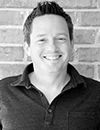
Jeff Schultz, Co-Founder, Phase, Inc.
Jeff Schultz, co-founder of Phase, has more than 20 years’ experience developing novel 3D printing techniques for a wide range of applications. Now, with the support of 3 NIH grants, Schultz is focusing on developing a novel way to 3D print microfluidics to make organ-on-a-chip models more commercially applicable and accessible. He earned his Ph.D., M.S., and B.S. in materials engineering from Virginia Tech, where his research focused on understanding the ranges of physical, rheologic and thermodynamic properties that made a polymer suitable for selective laser sintering additive manufacturing. Schultz then became a principal partner in a start-up 3D-printing company which developed metal additive manufacturing technology and aerodynamics instrumentation. There, he led technology development and was the first inventor on all the key patents related to its additive friction stir technology. After exiting the company, Schultz earned his MBA from MIT and then built the US additive manufacturing business unit for Oerlikon Corporation, a Swiss industrial conglomerate. The facility he grew and led at Oerlikon was among the largest additive manufacturing component production facilities globally. After a successful scale-up at Oerlikon, Schultz returned to entrepreneurship and co-founded Phase, his second startup focused on developing additive manufacturing technology. The company has received support from the NIH, NC Biotech, and the State of North Carolina, and has 5 patents in various stages related to its novel 3D printing and VivorrayTM technology.
Jim Heath Biographical Sketch
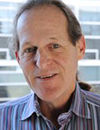
Jim Heath, President, Institute for Systems Biology
Dr. James R. Heath is President and Professor at Institute for Systems Biology in Seattle. Heath also has the position of Professor of Molecular and Medical Pharmacology at UCLA. Formerly, he was the Elizabeth W. Gilloon Professor of Chemistry at Caltech, and served as co-director of the Parker Institute for Cancer Immunotherapy at UCLA until 2017. Heath has had a profound impact on ISB since taking over leadership in 2018. He continues to make important discoveries in the field of cancer immunotherapy, and in 2022 was selected to lead a National Cancer Institute Comprehensive Cancer Center to study sequential targeted inhibitors and immunotherapies. At the beginning of the COVID-19 pandemic, Heath quickly pivoted the focus of his lab and collaboratively worked with others within and beyond ISB to uncover secrets behind COVID-19 and long COVID. He published research that has changed how COVID-19 is understood, and now leads the Pacific Northwest consortium of the NIH-funded RECOVER study, which aims to understand the long-term effects of COVID. Heath received his PhD in 1988 from Rice University, where he was the principal graduate student involved in the discovery of C60 and the fullerenes. He was a Miller Fellow at UC Berkeley before joining the research staff at IBM Watson Labs in 1991. He took a faculty position at UCLA in 1994, and moved to Caltech in 2003. He has received several awards and honors, including the Irving Weinstein Award from the American Association of Cancer Researchers, and the Sackler Prize in the Physical Sciences. In 2009, he was named one of the top seven innovators in the world by Forbes Magazine. Heath has founded or co-founded several companies, including PACT Pharma, Integrated Diagnostics, Indi Molecular, CTI Molecular Imaging (acquired by Siemens in 2005), Sofie Biosciences, Isoplexis, and NanoSys.
Jing Chen Biographical Sketch
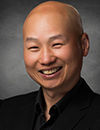
Jing Chen, Founder & CEO, Hicomp Microtech
Dr. Jing Chen has amassed 28 years of expertise in Microfluidics, MEMS, and Manufacturing Engineering. He earned his PhD from Tsinghua University, furthered his research at the University of Michigan, and served as a tenured professor at Peking University for 16 years. In 2014, Dr. Chen founded HiComp, which specializes in microfluidic and lab-on-chip products for various industries. He has authored over 180 papers, 70 patents, and 6 books, making significant contributions to the field.
Kevin Healy Biographical Sketch
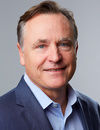
Kevin Healy, Jan Fandrianto and Selfia Halim Distinguished Professorship in Engineering, University of California, Berkeley
Kevin E. Healy, Ph.D. is the Jan Fandrianto and Selfia Halim Distinguished Professor in Engineering at the University of California at Berkeley in the Departments of Bioengineering, and Materials Science and Engineering. He served as Chair of the Department of Bioengineering from 2011 to 2015. He is a thought leader and innovator working at the interface between stem cells and materials science to develop dynamic engineered systems to explore both fundamental biological phenomena and new applications in translational medicine. His group currently conducts research in the areas of: bioinspired stem cell microenvironments to control stem cell lineage specification and self-organization into microtissues or organoids; bioinspired systems for regenerative medicine; biological interfaces; and, microphysiological systems for drug development, gene editing, and environmental toxicity screening. Professor Healy is an elected Fellow of AIMBE, AAAS, FBSE, BMES, and recently received an Alexander von Humboldt Foundation Award. He has chaired the Gordon Research Conference on Biomaterials and Biocompatibility, and has been honored with the 2011 Clemson award for outstanding contributions to basic biomaterials science. He is a named inventor on numerous issued United States and international patents relating to biomaterials, therapeutics, stem cells, and medical devices, and has founded several companies to develop these systems for applications in biotechnology and regenerative medicine.
Leanna Levine Biographical Sketch
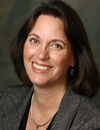
Leanna Levine, Founder & CEO, ALine, Inc.
Dr. Levine, founder of ALine, Inc., is an entrepreneur, technologist, and inventor. She has a unique blend of technical expertise in both bioanalytical science and manufacturing process development. Prior to founding ALine, Dr. Levine developed bioanalytical technology to support life science research. While at Monsanto, her lab led the industry in the application of fluorescence polarization for high throughput screening for novel therapeutics. In 1998 she joined Spectrum Laboratories as Director of Hollow Fiber Manufacture and Product Development. Dr. Levine earned her Ph.D. at Washington University, St. Louis, MO , and her B.S. in Biochemistry and BA in German from the University of Missouri, Columbia, MO. In 2003 she was a visiting scholar at the UCLA Anderson School of Business. In 2000 she was the chair of the Gordon Conference on Bioanalytical Sensors. She is the co-author on a dozen publications, and several patents.
Magdalena Schimke Biographical Sketch

Magdalena Schimke, Sales Specialist, STRATEC Consumables GmbH
- Study of biomedicine and biotechnology
- Phd in regenerative medicine, stem cells and aging biology
- Clinical study work for high-altitude research program
- Lecturer at MedMastery and University of Salzburg for students and clinicians educational purposes
- STRATEC Consumables
Martyn Boutelle Biographical Sketch
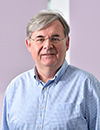
Martyn Boutelle, Professor of Biomedical Sensors Engineering, Imperial College London
Martyn Boutelle is Professor of Biomedical Sensors Engineering in the Department of Bioengineering, Imperial College London, and Associate Provost for Estates Planning for Imperial College. His research group is multidisciplinary comprising, bioengineers, scientists, and clinicians. He develops novel analytical science methods using microfluidics, electrochemical sensors / biosensors, and wireless electronics to make portable (sometimes wearable) monitoring devices for use as point of care devices - typically giving continuous real -time displays. He then uses these in a program of clinical science research focusing on the acute traumatic brain injury, kidney transplantation as well as neonatal and athlete monitoring. Martyn is past president of the International Society for Monitoring Molecules in Neuroscience, and a founder of the COSBID organization for studying acute human brain injury. He published > 190 papers, chapters and patents. He obtained a BSc and PhD in Chemistry from Imperial College and worked as an EP Abraham Research Fellow in the University of Oxford.
Nicolas Brillouet Biographical Sketch

Nicolas Brillouet, CTO, Kloé
Nicolas Brillouet is from Occitania, France. He graduated from Montpellier University in 2000, before completing a first one-year industrial experience in L.I.L.T Canada, a North-American private company working in photonics industry. Then, he finally went back to France to work alongside Paul Coudray during his creation of KLOÉ company, in 2001. From there, first working as an engineer and then as a project manager, Nicolas finally became the CTO of Kloe company, before managing more recently all the Production activity of Kloe equipment range, with, from now on, a more than 24 years-experience in both industry and microfabrication techniques.
Noah Malmstadt Biographical Sketch
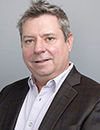
Noah Malmstadt, Professor, Mork Family Dept. of Chemical Engineering & Materials Science, University of Southern California
Noah Malmstadt is Professor at the University of Southern California. He received a BS in Chemical Engineering from Caltech and a PhD in Bioengineering from the University of Washington. Following postdoctoral work at UCLA, he joined the Mork Family Department of Chemical Engineering and Materials Science at USC in 2007. Malmstadt is the recipient of a 2012 Office of Naval Research Young Investigator award. His research focuses on microfluidic strategies to facilitate material fabrication and biophysical analysis. He has pioneered the integration of ionic liquids as solvents in droplet microreactors and the application of microfluidic systems to synthesizing biomimetic cell membranes. Microfluidic analytical techniques he has developed include methods for measuring the permeability of cell membranes to druglike molecules and techniques for measuring ionic currents through membrane proteins.
Pranav Soman Biographical Sketch
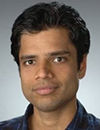
Pranav Soman, Professor, Biomedical and Chemical Engineering, Syracuse University; IPA Program Director, Advanced Manufacturing (AM), National Science Foundation (NSF)
Pranav Soman holds two positions, as a Professor at Syracuse University, and as an IPA Rotator Program Director of the Advanced Manufacturing (AM) program at the National Science Foundation (NSF). As an academician, Prof. Soman’s central research focus is to develop new processing and printing technologies to create reliable models to capture key aspects of in vivo physiology and pathophysiology. Toward this goal, his group has developed a technology toolbox to provide a manufacturing solution to advance research in bioprinting, microfluidics, organ-on-chip, tissue engineering, regenerative medicine, and single cell analysis. He is also the founder of 3D Microfluidics LLC (3DM), a startup funded by NSF SBIR grant to provide cost-effective microfluidics solutions to researchers in life sciences. As a recently appointed Program Director at NSF, Prof. Soman’s roles include the advocacy of cutting-edge interdisciplinary research and education in advanced manufacturing and mentoring junior research members in the field.
Roger Kamm Biographical Sketch
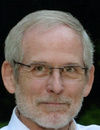
Roger Kamm, Cecil and Ida Green Distinguished Professor of Biological and Mechanical Engineering, Massachusetts Institute of Technology (MIT)
Kamm is currently the Cecil and Ida Green Distinguished Professor of Biological and Mechanical Engineering at MIT, where he has served on the faculty since 1978. Kamm has long been instrumental in developing research activities at the interface of biology and mechanics, formerly in cell and molecular mechanics, and now in engineered living systems. Current interests are in developing models of healthy and diseased organ function using microfluidic technologies, with a focus on vascularization, metastatic cancer and neurological disease. Kamm has fostered biomechanics as Chair of the US National Committee on Biomechanics (2006-2009) and of the World Council on Biomechanics (2006-2010). For 10 years, he was Director of the NSF Science and Technology Center on Emergent Behaviors of Integrated Cellular Systems. He is the 2010 recipient of the ASME Lissner Medal and the 2015 recipient of the Huiskes Medal, both for lifetime achievements, and was the inaugural recipient of the ASME Nerem Medal for mentoring and education. He was elected to the National Academy of Medicine in 2010 and Engineering in 2022. Kamm is co-founder of AIM Biotech, a manufacturer of microfluidic systems for 3D culture.
Steve George Biographical Sketch

Steven C. George, Edward Teller Distinguished Professor and Chair, Department of Biomedical Engineering, University of California-Davis
Steven C. George, M.D., Ph.D. is a Professor of Biomedical Engineering at the University of California, Davis. He received his bachelors degree in chemical engineering in 1987 from Northwestern University, M.D. from the University of Missouri School of Medicine in 1991, and Ph.D. from the University of Washington in chemical engineering in 1995. He was on the faculty at the University of California, Irvine for 19 years (1995-2014) where he pursued a range of research interests including pulmonary gas exchange, lung mechanics, vascularizing engineered tissues, and microphysiological systems. The NIH FIRST award in 1998 and the CAREER and Presidential Early Career Award for Scientists and Engineers (PECASE) from the National Science Foundation in 1999 have previously recognized his work. While at UCI, he served as the William J. Link Professor and founding Chair of the Department of Biomedical Engineering (2002-2009), the Director of the Edwards Lifesciences Center for Advanced Cardiovascular Technology (2009-2014), and was the PI on a T32 predoctoral training grant from the National Heart Lung and Blood Institute. In 2014 he transitioned to become the Elvera and William Stuckenberg Professor and Chair of Biomedical Engineering at Washington University in St. Louis, and in 2017 moved to the UC Davis. He was elected a fellow in the American Institute of Medical and Biological Engineering (AIMBE) in 2007, a fellow of the Biomedical Engineering Society in 2017, has published more than 140 peer-reviewed manuscripts, and co-founded two early start-up companies. His work is currently funded by grants from the NIH that focus on creating tissue engineered models of the cardiac, pancreas, bone marrow, and cancer microenvironments using induced pluripotent stem cell and microfabrication technology.
Steve Soper Biographical Sketch
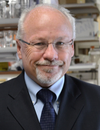
Steve Soper, Foundation Distinguished Professor, Director, Center of BioModular Multi-scale System for Precision Medicine, The University of Kansas
Prof. Soper (since 2016) is a Foundation Distinguished Professor in Chemistry and Mechanical Engineering at the University of Kansas. At KUMC, Prof. Soper holds an adjunct appointment in the Cancer Biology Department and is a member of the KU Cancer Center. He also holds an appointment at Ulsan National Institute of Science and Technology in Ulsan, South Korea, where he is a World Class University Professor.
As a result of his efforts, Prof. Soper has secured extramural funding totaling >$125M, has published over 245 peer-reviewed manuscripts (h index = 70; >17,000 citations); 31 book chapters and 71 peer-reviewed conference proceeding papers, and is the author of 12 patents. He is also the founder of a startup company, BioFluidica, which is marketing devices for the isolation and enumeration of liquid biopsy markers. Soper recently founded a second company, Sunflower Genomics, which is seeking to market a new DNA/RNA single-molecule sequencing platform. His list of awards includes Ralph Adams Award in Bioanalytical Chemistry, Chemical Instrumentation by the American Chemical Society, the Benedetti-Pichler Award for Microchemistry, Fellow of the AAAS, Fellow of Applied Spectroscopy, Fellow of the Royal Society of Chemistry, R&D 100 Award, Distinguished Masters Award at LSU and Outstanding Scientist/Engineer in the state of Louisiana in 2001. Finally, Prof. Soper has granted 50 PhDs and 7 MS degrees to students under his mentorship. He currently heads a group of 15 researchers.
His major discoveries include: (1) Technology for the detection of liquid biopsy markers that can manage a variety of diseases using a simple blood test (test has been demonstrated in multiple myeloma, pediatric acute lymphoblastic leukemia, acute myeloid leukemia, pancreatic, breast, colorectal, prostate, and ovarian cancers); (2) new hardware and assay for the point-of-care diagnosis of acute ischemic stroke; (3) single-molecule DNA and RNA sequencing nanotechnology; and (4) currently working on a home-test for COVID-19 infections (handheld instrument and the associated assay.
Théo Champetier Biographical Sketch
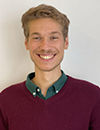
Théo Champetier, Technical Sales Engineer, Elveflow
Théo Champetier is part of the commercial team at Elveflow in Paris, France
Valérie Taly Biographical Sketch
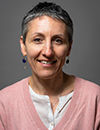
Valérie Taly, CNRS Research Director, Professor and Group leader Translational Research and Microfluidics, Université Paris Cité
V. Taly is a CNRS research director and group leader of the Translational Research And Microfluidics team within the clinical oncology research unit MEPPOT (personalized medicine pharmacogenomics and therapeutic optimization) in the Cordeliers Research Center (university Paris Cité). Her team performs interdisciplinary researches aiming at developing and validating microfluidic tools for cancer research in close collaboration with clinicians and researchers in oncology and toxicology. Since 2008, she developed droplet-based digital procedures for Cancer diagnosis. Recently, her research has been dedicated to the clinical validation of droplet-based microfluidics for the non-invasive detection of Cancer biomarkers, the highlighting of new Cancer Biomarkers and the development of original tools and procedures for their detection with applications in personalized medicine, cancer recurrence detection and cancer diagnostics. She is co-founder of EMULSEO (2018) and METHYS DX (2021) start up companies.
Venkat Gundabala Biographical Sketch
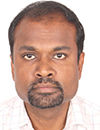
Venkat Gundabala, Associate Professor, Indian Institute of Technology (IIT) Bombay
Venkat Gundabala currently is an Associate Professor in the department of Chemical engineering at IIT Bombay. He obtained his M.S. from Drexel University, USA and his PhD from University of Sheffield, UK, both in Chemical engineering. After that he had postdoctoral stints at University of Cambridge, UK and Georgia Institute of Technology, USA, before joining IIT Bombay in 2012. He has worked in a variety of areas such as droplet-based Microfluidics, Lab-on-a-chip for biological applications, Nano-composites, and water-based coatings. At IIT Bombay, his main research includes using microfluidic tools to synthesize nano-materials and developing Lab-on-a-chip devices for biological applications (particularly for studying C. elegans). His other research interests include nano-composites and functional coatings.
Victor Cahoreau Biographical Sketch
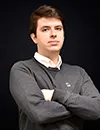
Victor Morel Cahoreau, Head of Sales, Eden Microfluidics
After a master's in numerical simulation (Université de Rouen) and a double master's in complex physics & microfluidics (Sorbonne Université - IPGG - ESPCI), Victor MOREL CAHOREAU chose to continue in the amazing world of microfluidics. His role at Eden Tech is to bridge the gap between prototyping and mass production with Eden Tech's cutting-edge products.
